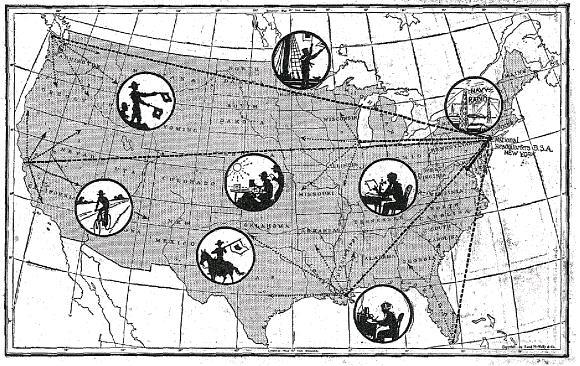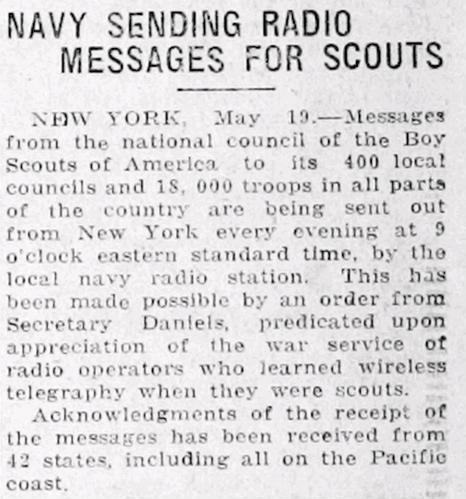Among the many hats I wear is that of counselor for the Radio Merit Badge. I was also on the staff of K2BSA at the 2013 National Scout Jamboree.
Radio has a long history with scouting. The first edition of the Scout Handbook includes several pages on how to construct an “up-to-date wireless apparatus for stationary use in the home or at the meeting place of each patrol.” Wireless Merit Badge was originated in 1918 and was renamed Radio in 1923. And in 1920, scouts were called upon to relay government bulletins to their communities. This small item appeared in the Ogden (Utah) Standard-Examiner of May 19, 1920.
It reports that the Naval radio station in New York was sending out a daily message to scouts from the National Council of the BSA, “predicated upon appreciation of the war service of radio operators who learned wireless telegraphy when they were scouts.” It reports that the signals had been received from 42 states, including all on the Pacific coast.
More details, including the illustration shown above, are given in the July 1920 issue of Boys Life. The message was sent each evening from station NAH at 9:30 PM Eastern time at 25 words per minute, with a 1500 meter (what we would today call 200 kHz) spark signal. The 30-50 word messages “always contain something of interest to boys. Sometimes they are from the Department of Agriculture or some other government department, with a request for each operator to make the message known to the public immediately.” The recipient was expected to have a system of reaching those in his neighborhood, such as “farmers’ telephone, semaphore, Morse flag, blinker or heliograph,” or even a “good horse, a bicycle, motorcycle, automobile, sea-scout cutter or other vehicle.”
The Boys’ Life article concludes by admonishing every scout to have arrangements to receive the daily NAH bulletins, and to do his part when a test message or other urgent communication comes through.
The June 1920 issue of Boys’ Life points out that “neither the army, navy, postal service nor any land telegraph or telephone company can cover the country as quickly, at present, as the scouts will be able to do if they grasp their opportunity and make use of the Navy’s cooperation.” The article also admonishes that “every tenderfoot, second-class and first-class scout should consider signal practice with buzzer sets or radio sets at once” to avail themselves of this opportunity, the value of which to our government would be beyond calculation.
Click Here For Today’s Ripley’s Believe It Or Not Cartoon ![]()


